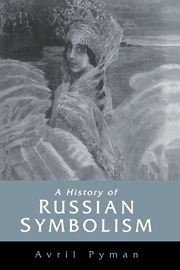Book contents
- Frontmatter
- Contents
- Preface
- Acknowledgements
- Note on the text and list of abbreviations
- Prologue: decadence or rebirth? The European fin de siècle and the Russian precursors
- Part 1 The art of the cell
- 1 Transitional writers (1892–1898). Volynsky and Severvnyi Vestnik, Minsky and the early Merezhkovsky
- 2 The new poetry in St Petersburg. Zinaida Hippius and Fedor Sologub (1893 onwards)
- 3 Russian Symbolism acquires a name. Bal′mont, Briusov, Dobroliubov and Konevskoi (1894–1900)
- Part 2 Collective creation
- Part 3 Gleams of paradise
- Part 4 A glittering hell
- Part 5 Our home from the beginning
- Epilogue
- Chronology
- Notes
- Bibliography
- Index
1 - Transitional writers (1892–1898). Volynsky and Severvnyi Vestnik, Minsky and the early Merezhkovsky
Published online by Cambridge University Press: 08 January 2010
- Frontmatter
- Contents
- Preface
- Acknowledgements
- Note on the text and list of abbreviations
- Prologue: decadence or rebirth? The European fin de siècle and the Russian precursors
- Part 1 The art of the cell
- 1 Transitional writers (1892–1898). Volynsky and Severvnyi Vestnik, Minsky and the early Merezhkovsky
- 2 The new poetry in St Petersburg. Zinaida Hippius and Fedor Sologub (1893 onwards)
- 3 Russian Symbolism acquires a name. Bal′mont, Briusov, Dobroliubov and Konevskoi (1894–1900)
- Part 2 Collective creation
- Part 3 Gleams of paradise
- Part 4 A glittering hell
- Part 5 Our home from the beginning
- Epilogue
- Chronology
- Notes
- Bibliography
- Index
Summary
Петухов ночное пенье
Холод утра это мы.
Д. С. МережковскийThe first chill light of the dawning Silver Age emanated from the literary section of a formerly well-respected Populist journal, Severnyi Vestnik (The Northern Herald). The literary editor, Akim Volynsky (real name Akim L′vovich Flekser), was an old-fashioned Kantian idealist who in fact disapproved – both aesthetically and ideologically – of much that the new poets whose work he published were trying to do, and who not infrequently subjected their innovations to virulent criticism in his section of the journal. Their enemies, however, were his: utilitarianism, materialism and the cultural complacency of the liberal establishment.
Volynsky had accepted the literary editorship of Severnyi Vestnik in 1891, shortly after Liubov' Gurevich took over as publisher and editor of the ailing journal in partnership with M. N. Al'bov, a relict of the Populist editorial board of the 1880s. Volynsky was encouraged by Gurevich to use his position to further the cause of ‘idealism in art’. He did not consider himself a ‘symbolist’ or a ‘decadent’, but he was brave enough to fly in the face of public opinion by publishing a handful of semi-outcast or debutant authors who had been branded as such, and thus, for a few brief years in a long, industrious life, became a mover of literature.
- Type
- Chapter
- Information
- A History of Russian Symbolism , pp. 19 - 37Publisher: Cambridge University PressPrint publication year: 1994



